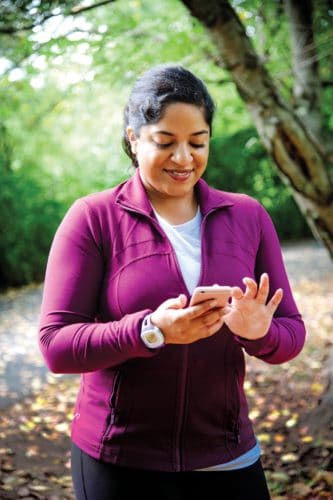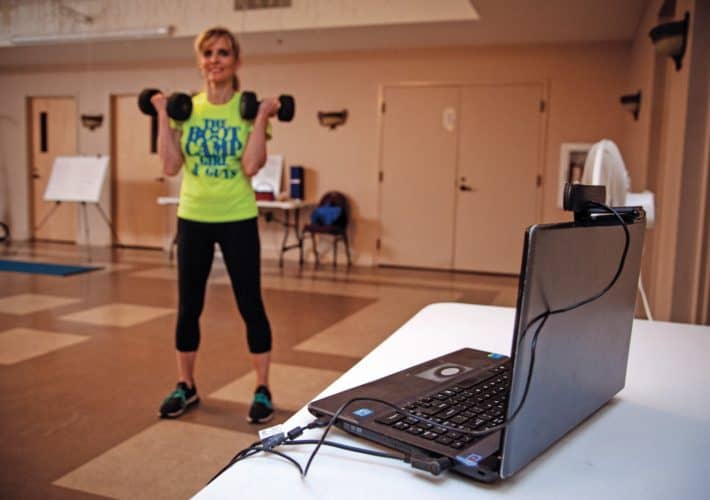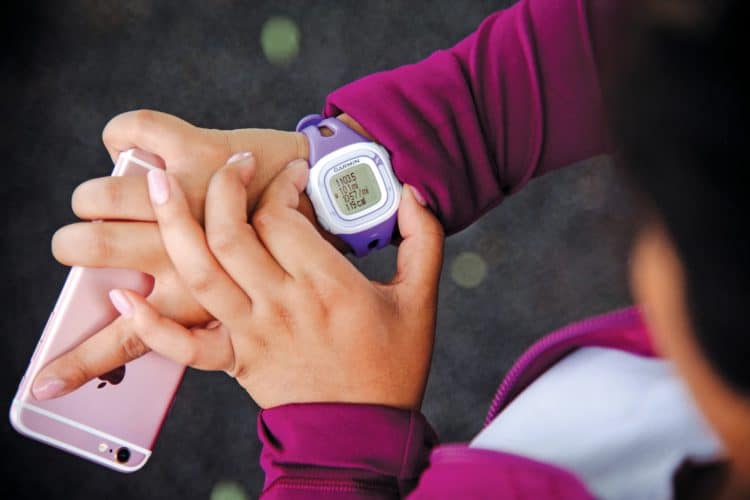WHEN IT COMES TO TRACKING YOUR WORKOUT, THERE’S AN APP FOR THAT
STORY BY Molly Fellin Spence PHOTOGRAPHY BY Robin Shotola
November/December 2017
Sana Waheed is all about the social aspect of exercising.
“For me, the best way to end a long workday is to meet up with my favorite running partners and chit-chat the miles away while we sweat,” said Waheed, 28, of Columbia.
While earning her master’s degree, Waheed also works full time and runs a photography business. So, fitting regular exercise into her schedule can be a challenge, as is finding the motivation to move instead of relax at the end of a long day.
“If I have plans to meet my running group or my trainer I am more likely and more motivated to get my workout in,” she says.
Another motivator for Waheed? Social media and workout apps. Waheed uses Instagram and apps like Run¬keeper and Sweat to gain inspiration and support, as well as to track her progress. She also frequently logs in to the PureBarre app to easily sign up for a barre fitness class when she’s on the run—literally or figuratively.
“I don’t have time at work to log on to a website to sign up for classes, so apps make it easy to get in a class, track my miles or get workout inspiration,” she says.
The apps also reinforce her efforts when she isn’t working out. “I love looking at how many miles I have run during the week and I am always encouraged when I see that I have set a new personal record.”
Waheed says that technology and social media have allowed her to connect with like-minded people to share her health and fitness journey. She tracks that progress on her blog, supersana.com, and via Instagram (@thesupersana). Scrolling through others’ posts on Instagram inspires Waheed, and she says it makes her feel like she can achieve her goals, too. “When you surround yourself with hard working, passionate and healthy individuals you are more likely to live that lifestyle,” she says.
Most fitness enthusiasts and per¬sonal trainers embrace the benefits of using apps and social support to achieve fitness and wellness goals. Low physical activity leads to chronic disease, weight gain and all sorts of health problems as we age. The U.S. Office of Disease Prevention and Health Promotion’s (ODPHP) Phys¬ical Activity Guidelines for Americans state that an active lifestyle can lower your risk of early death as well as heart disease, stroke, high blood pressure, type 2 diabetes, cancer and depression. And, being physically active can help you sleep better, too.
Though we know exercise and eating right can lead to weight loss and better health, getting started on the path to wellness can be daunting. Enter tech¬nology. According to the Pew Research Center, about 90 percent of Americans currently have access to the Internet, and nearly 75 percent of us  own a smartphone. With these tools, it’s now easier than ever to get information, track progress and share results to help keep us accountable to our fitness and health goals. In short, if you want to get healthy and remain so, there’s an app for that.
own a smartphone. With these tools, it’s now easier than ever to get information, track progress and share results to help keep us accountable to our fitness and health goals. In short, if you want to get healthy and remain so, there’s an app for that.
In fact, there are about 100,000 apps for that. According to a recent study published in the Journal of Medical Internet Research, literally thousands of apps are available for free or low cost and are regularly downloaded to help smartphone users with health-related goals.
Stephanie Dignan, a personal trainer in Columbia, agrees that account¬ability and inspiration via apps and social media can lead to motivation for herself and her clients. Dignan teaches fitness classes in the Glen¬wood, Columbia and Clarksville areas through her business The Bootcamp Girl, which has existed for nine years.
A certified personal trainer, a group exercise instructor, a certified body flow instructor, a certified yoga instructor and a certified Tabata Boot Camp instructor, Dignan grew up in western Howard County where she was active as a child in gymnastics, cheerleading, swimming and diving at Glenelg High School. Dignan knows that an active lifestyle is important and encourages her clients to focus on sustainable changes to achieve their goals.
“We focus on the results, not just the workout,” Dignan said. “Helping people maintain the results for a lifetime is our goal.”
Technology, including smartphone apps, has helped many of Dignan’s clients track their progress and stay accountable. She encourages using the MyFitnessPal app to record daily food intake. Her clients can add her as a friend on the app so she can see what they are eating and offer feedback.
In poor weather or when traveling, fitness clients also use Skype on their phones or laptops to attend classes virtually and check in with trainers. “Any way that apps can lead to more accountability is where they help,” she said. Apps, she says, “have always been a positive for us.”
For some, though, apps may be less helpful. Kim Farrell, a personal trainer and group fitness instructor in Clarksville, says she has a different mindset when it comes to apps and tracking. Initially, she says she felt that using apps like MyFitnessPal, which help users track activities and food intake were helpful. However, she says, they may not create sustainable change. “For the long haul, I feel that it’s more about creating new habits and chang¬ing your mindset,” Farrell says. “There may be apps for that, but I haven’t found any that stand out.”
Instead of apps, Farrell focuses on teaching clients new habits through education and seminars to supplement their fitness classes. Through her own weight loss journey Farrell learned a lot about herself and how to change bad habits into good habits for life, which is the driving force behind her overall fitness philosophy.
There is limited evidence available to show whether apps can ultimately lead to positive, long-term fitness changes. A study published in the July 2015 edition of the “Journal of Medical Internet Research” stated that despite the ubiquitous number of apps avail¬able to track and facilitate physical activity, no systematic assessments have been performed to evaluate whether these apps are of high quality and produce results using sound fitness principles and scientific evidence.
The study reviewed a set of 30 popular mobile apps related to physical activ¬ity on an iPhone and compared content against the current guidelines and fitness principles established by the American College of Sports Medicine (ACSM). A scoring method weighed the quality of content for aerobic, resistance and flexibility components of the fitness coaching apps.
Very few apps, the study found, use evidence-based methods or respect the guidelines for aerobic activity, strength/resistance training and flexibility set forth by the ACSM. And, ultimately, researchers advised caution when adopting a new app for physical activity purposes.
Even so, exercise and fitness apps are in their earliest stages. If they help give you a kick in the butt, they may prove worthwhile.*




